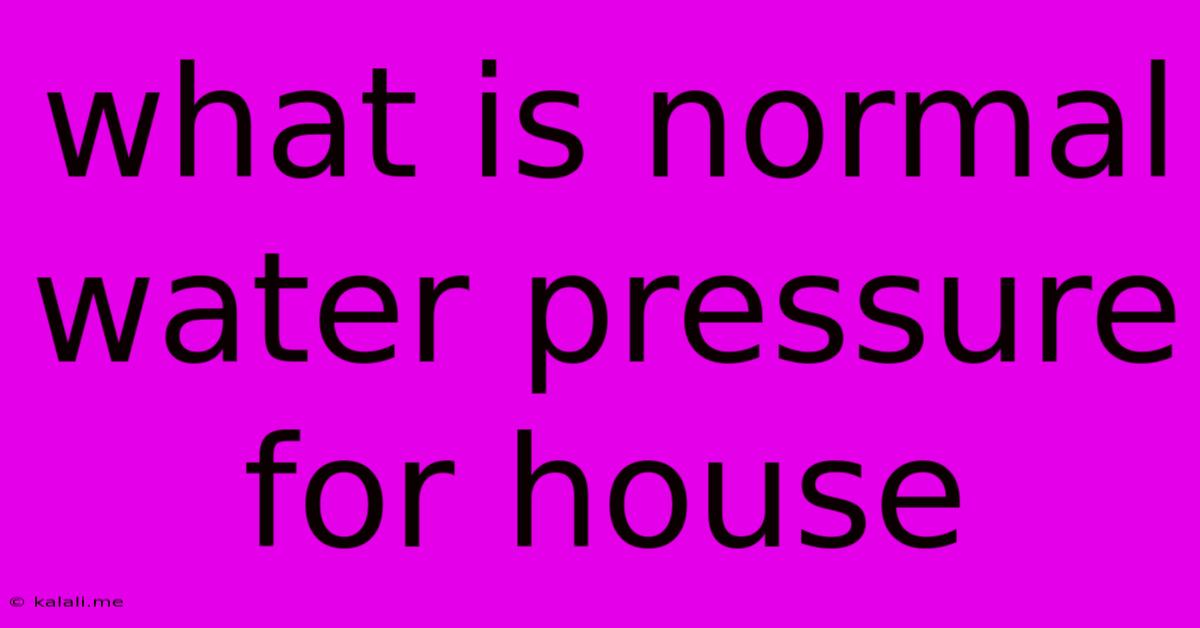What Is Normal Water Pressure For House
Kalali
Jun 01, 2025 · 3 min read

Table of Contents
What is Normal Water Pressure for a House? A Comprehensive Guide
Understanding your home's water pressure is crucial for ensuring efficient plumbing and appliance performance. Too little pressure leads to weak showers and sluggish appliances, while excessive pressure can damage pipes and fixtures. This guide will delve into what constitutes normal household water pressure, how to measure it, and what to do if your pressure is outside the ideal range.
What is Considered Normal Water Pressure?
The generally accepted range for normal water pressure in a house is between 40 and 60 PSI (pounds per square inch). However, some municipalities might have slightly different standards, and even within this range, your ideal pressure might depend on factors like the age and design of your plumbing system. Anything below 40 PSI is considered low, while anything above 60 PSI is considered high. Pressures consistently above 80 PSI can pose significant risks to your plumbing.
Factors Affecting Water Pressure
Several factors can influence the water pressure in your home:
- Municipal Water Supply: Your local water utility plays a significant role. Check with them if you suspect a problem originates from their system. They can often provide information about current pressure levels in your area.
- Water Meter: Issues with your water meter or the pipe leading from the meter to your house can restrict water flow, leading to low pressure.
- Pipe Diameter: Smaller diameter pipes restrict water flow more easily than larger ones. Older homes might have smaller pipes that limit pressure.
- Pipe Leaks: Even small, unseen leaks can significantly reduce your overall water pressure. These leaks could be within walls, under the ground, or in other hard-to-reach areas.
- Fixtures and Appliances: Clogged showerheads, faulty faucets, or restricted appliance inlets can all diminish the water pressure experienced at those points.
- Altitude: Higher altitudes often result in lower water pressure due to gravity.
How to Measure Your Water Pressure
Measuring your home's water pressure is relatively straightforward. You'll need a water pressure gauge, available at most hardware stores. Follow these steps:
- Turn off all water-using appliances. This ensures an accurate reading.
- Locate an outside faucet. This is typically the best place to take a reading as it is closer to the main water supply.
- Attach the pressure gauge. Follow the manufacturer's instructions for connecting the gauge to the faucet.
- Turn on the faucet. Let the water run for a few minutes to allow the pressure to stabilize.
- Read the gauge. The number displayed is your water pressure in PSI.
Troubleshooting Low Water Pressure
If your pressure consistently falls below 40 PSI, consider these troubleshooting steps:
- Check for leaks: Look for obvious leaks and signs of water damage.
- Inspect faucets and showerheads: Clean or replace any clogged fixtures.
- Check your water meter: Ensure it is functioning correctly and isn't partially closed.
- Contact your water utility: They can check for problems with the main water supply line.
Troubleshooting High Water Pressure
High water pressure requires professional attention. Excessive pressure can damage your plumbing system and appliances. Consider contacting a licensed plumber to:
- Install a pressure regulator: This device reduces the incoming water pressure to a safe level.
- Identify and repair any leaks: High pressure exacerbates leaks, leading to further damage.
By understanding what constitutes normal water pressure and how to measure it, you can proactively maintain your home's plumbing system and ensure efficient water use. Remember, addressing pressure issues promptly prevents costly repairs and ensures optimal performance of your appliances.
Latest Posts
Latest Posts
-
Ceiling Light Red White Black Wires
Jun 03, 2025
-
Cap Locks Blinks And Laptop Freezes On Eos Linux
Jun 03, 2025
-
How To Wire Multiple Outlets On Same Circuit
Jun 03, 2025
-
How To Find Leak Ac On Car
Jun 03, 2025
-
Magic Trackpad 2 Use At 90 Degree Rotate
Jun 03, 2025
Related Post
Thank you for visiting our website which covers about What Is Normal Water Pressure For House . We hope the information provided has been useful to you. Feel free to contact us if you have any questions or need further assistance. See you next time and don't miss to bookmark.